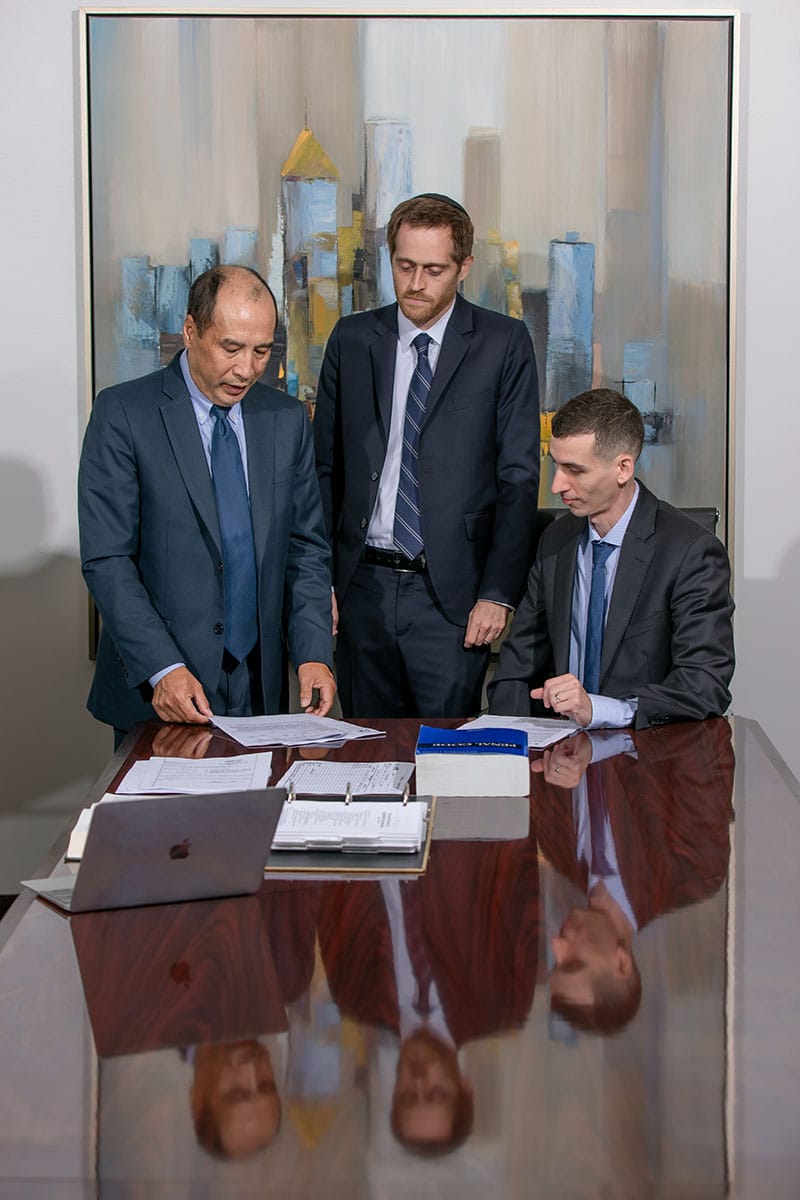Spolin Law P.C. Has Proven Strategies That Win

Award-winning criminal defense attorney Aaron Spolin and his team of aggravated battery lawyers at Spolin Law P.C. have proven strategies that win cases. They use legal motions to request that the court exclude key evidence and dismiss the case entirely. They obtain as much evidence as possible, and work to use the prosecutor’s evidence against them. Mr. Spolin knows how to develop strong defenses that protect his clients’ freedom. (Every case is unique, and prior success is not a “guarantee” of the same outcome on a future case.)
To find out how the strategies of Spolin Law P.C. can be used in your case, call Mr. Spolin and his legal team at (310) 424-5816.
PC 243(d) Aggravated Battery vs. PC 242 Simple Battery
In order to understand “aggravated battery,” you need to understand the basic term of “battery” first. “Simple” battery is a different crime than aggravated battery, or battery that causes serious bodily injury.
What Is Battery – PC 242?
California Penal Code (PC) 242 defines battery as “any willful and unlawful use of force or violence upon the person of another.” It includes touching another person in a harmful or offensive manner without the person’s consent, whether through direct contact with another, touching their clothing, or causing an object or someone else to touch another person.
“Simple” battery does not require that any specific injury be caused by the touching. It is enough that the touching was “harmful or offensive.”
PC 243(d) – Aggravated Battery Causing Serious Bodily Injury
Aggravated battery in California is a term used in Penal Code 243(d) to describe a battery that results in a serious bodily injury.
A serious injury is an impairment of a person’s physical condition, such as loss of consciousness, a concussion, a bone fracture, protracted loss or impairment of function of any body part, a wound requiring extensive suturing, or serious disfigurement. The victim does not need to seek medical attention for their injury for it to be considered serious.
Elements of Aggravated Battery in California
To be guilty of aggravated battery, the prosecution must prove that the defendant:
- Willfully and unlawfully touched another person in a harmful or offensive manner, AND
- Caused the other person to suffer serious bodily injury as a result.
What Does It Mean to Act Willfully?
To act willfully means to do something willingly or on purpose. The law does not require that a person intend to break the law, hurt someone else, or gain any advantage from the unlawful touching.
For example, if a person purposefully bumps another and the other person trips and falls, sustaining a serious bodily injury, that person has committed aggravated battery because they willingly or purposefully bumped the other person, even though they did not mean to cause a serious injury.
What Is a Serious Bodily Injury?
The law does not set out an exhaustive list of which specific injuries are serious and which are not. Whether a victim’s injuries are serious is a question of fact, not law, to be determined by a jury on a case-by-case basis.
This causes some uncertainty in predicting the outcome in a case of aggravated battery, since one jury may find the injury sustained “serious” while another jury may determine that the same injury did not rise to the level of a “serious injury.”
If you have questions about the elements of aggravated battery or how Spolin Law P.C. can help with your case, call (310) 424-5816.
- PC 243(d) Aggravated Battery vs. PC 242 Simple Battery
- Penalties for Violation of PC 243(d)
- Defenses to Aggravated Battery Charges in California
- Offenses Related to Aggravated Battery
- Learn How a California Aggravated Battery Attorney Can Help You
Penalties for Violation of PC 243(d)
Aggravated battery in California can be charged as a misdemeanor or a felony depending on the circumstances, making it a “wobbler” offense.
If convicted of misdemeanor aggravated battery, a person faces incarceration in a county jail not exceeding one year and a fine of up to $1,000.
If a person is convicted of felony aggravated battery, they may be sentenced to imprisonment in a state prison for two, three, or four years and fined up to $10,000.
Sentence Enhancements for Aggravated Battery
The sentence for felony aggravated battery may be increased or enhanced if the unlawful touching resulted in “great bodily injury,” which is distinct from “serious bodily injury.” To constitute great bodily injury, the harm to a person must be a “significant” or “substantial” physical injury that goes beyond an impairment of a person’s physical condition.
If a person is charged with and convicted of causing great bodily injury, the sentence referred to above is enhanced by an additional, consecutive term of imprisonment in the state prison for three years.
Additionally, the felony would be considered a “violent felony” and therefore a strike under California’s thee-strike law. That means if the person has prior violent felonies on their record, they could face up to life in prison.
The sentence for causing great bodily injury may be enhanced beyond the three years if the victim was:
- Over the age of 70 — five additional years
- Under the age of five — four, five, or six additional years
- Injured as a result of domestic violence — three, four, or five years.
The line between a serious bodily injury, which is an “impairment of a person’s physical condition,” and great bodily injury, which is a “significant” or “substantial” injury, is blurry. Whether a bodily injury is “serious” or “great” is a question of fact for the jury. As noted above, this may result in inconsistent verdicts and makes a charge of aggravated battery a difficult one to defend.
- PC 243(d) Aggravated Battery vs. PC 242 Simple Battery
- Penalties for Violation of PC 243(d)
- Defenses to Aggravated Battery Charges in California
- Offenses Related to Aggravated Battery
- Learn How a California Aggravated Battery Attorney Can Help You
Defenses to Aggravated Battery Charges in California

While “battery” is broadly defined in California as any harmful or offensive touching, several potent defenses to the charge of aggravated battery exist. The defenses include:
The Injury Was an Accident
While the person accused of aggravated battery need not have intended to cause the specific injury that the victim suffered, they must have acted willingly in committing the unlawful act that resulted in the injury.
If, for example, a person was pushed by someone else and then fell into another person, causing serious injury, the person did not commit aggravated battery because they did not intend to fall into the victim.
Self-Defense or Defense of Others
If the person who committed the unlawful touching or caused the injury was acting out of a reasonable belief that they, or another person, was in imminent danger of bodily harm and that such force was necessary to combat the harm, that person acted in self-defense or defense of others and did not commit an aggravated battery.
No Serious Bodily Harm
Aggravated battery requires that the victim suffer serious bodily harm; that is, an impairment of his or her physical condition. If the injury suffered by the victim was only a minor injury and did not impair the victim’s physical condition, a charge of aggravated battery will fail.
To find out if any of these defenses apply to your case, call the aggravated battery law firm Spolin Law P.C. at (310) 424-5816.
- PC 243(d) Aggravated Battery vs. PC 242 Simple Battery
- Penalties for Violation of PC 243(d)
- Defenses to Aggravated Battery Charges in California
- Offenses Related to Aggravated Battery
- Learn How a California Aggravated Battery Attorney Can Help You
Offenses Related to Aggravated Battery
There are other California crimes that are related to aggravated battery. They may be charged in addition to an aggravated battery allegation, or they may be alternative charges.
PC 242 — Simple Battery
If the injury the victim suffered does not rise to the level of a “serious injury,” the person who committed the unlawful act resulting in injury could be charged with simple battery, which does not require injury.
As long as a person touches another in a harmful or offensive manner, that person is guilty of battery, a misdemeanor. The penalty for battery is less severe than for aggravated battery: a fine not exceeding $2,000 and/or incarceration in a county jail not exceeding six months.
PC 203 — Mayhem
Depending on the injury suffered by the victim, a person may be charged with PC 203 mayhem. Mayhem means causing a disabling or disfiguring injury to someone else. A person may be guilty of mayhem if they injure another in a way that:
- Deprives the victim of a member of their body (such as a digit, limb, or organ)
- Disables, disfigures, or renders a part of the body useless
- Cuts or disables their tongue
- Puts out an eye
- Slits their nose, ear, or lip
Mayhem is always a felony and is a more serious crime than aggravated battery. It is punished by two, four, or eight years in California state prison or felony probation. Mayhem is a strike under California’s three-strike rule.
What Is the Difference Between Mayhem and Aggravated Battery?
The difference between aggravated battery and mayhem is the degree of injury. Generally, the injury required for a charge of mayhem is more significant than that required for aggravated battery. For mayhem, the injury must be disabling or disfiguring or deprive a person of use of a body part.
There is some confusing overlap in the two crimes. For example, the definition of “serious bodily injury” for aggravated battery includes “serious” disfigurement. Mayhem also includes disfigurement. Serious bodily injury includes an injury that requires suturing, while mayhem includes slitting the nose, ear, or lip of another person, which may also result in the need for suturing.
The degree of injury is a question of fact for the jury, which, as noted above, may result in inconsistencies in verdicts.
PC 245(a)(1) — Assault with a Deadly Weapon
PC 245(a)(1) defines another crime that is similar to aggravated battery – assault with a deadly weapon. This crime involves someone attacking or making an attempt to attack another person with a “deadly weapon” or in such a way that is likely to cause great bodily injury.
A deadly weapon is any object, instrument, or weapon that is inherently deadly or that may be used in a manner capable of causing or likely to cause great bodily injury or death. Deadly weapons include things like guns, knives, baseball bats, brass knuckles, vehicles, a glass bottle, a blunt object, and other items.
Assault with a deadly weapon is a wobbler offense, so it may be charged as a misdemeanor or felony. As a misdemeanor, a person may face up to one year in jail. If convicted of the felony, a person may face imprisonment for up to four years. A sentence enhancement may be assessed if a firearm was used.
- PC 243(d) Aggravated Battery vs. PC 242 Simple Battery
- Penalties for Violation of PC 243(d)
- Defenses to Aggravated Battery Charges in California
- Offenses Related to Aggravated Battery
- Learn How a California Aggravated Battery Attorney Can Help You
Learn How a California Aggravated Battery Attorney Can Help You

An aggravated battery charged under Penal Code 243(d) is considered a serious violent crime. It can result in years in prison, up to life if you have prior violent crime strikes under California’s Three-Strike Rule.
Spolin Law P.C.’s award-winning violent crime attorneys have a record of successful outcomes in cases like these. They can:
- Help you understand the law. It’s important to know the elements, available motions, and defenses to aggravated battery. Spolin Law P.C. attorneys are familiar with the California Penal Code and will help you understand your charges as well.
- Help you tell your story. We want to know what really happened. We will listen to you, gather evidence, and obtain information from the prosecutor to fill in the gaps. We will make sure your side of the story is heard.
- Obtain the best outcome possible. Spolin Law P.C. has a record of success. We carefully evaluate the facts of every case and develop strategies that win. We will work hard to protect your freedom.
If you have questions about your case, contact Mr. Spolin and his legal team at the law firm Spolin Law P.C. at (310) 424-5816.
